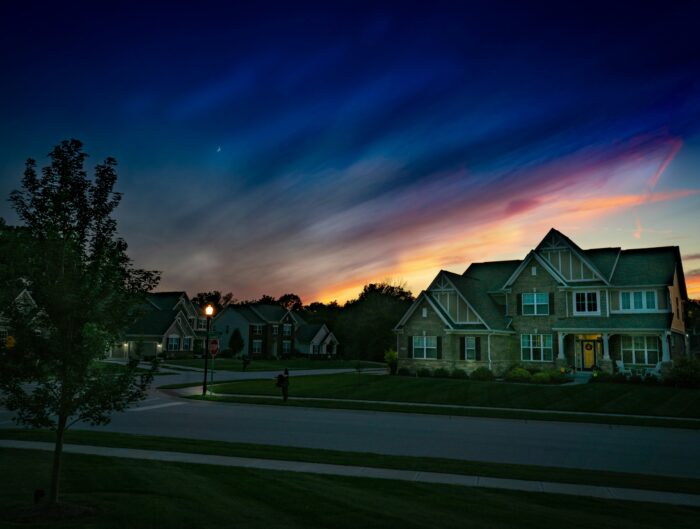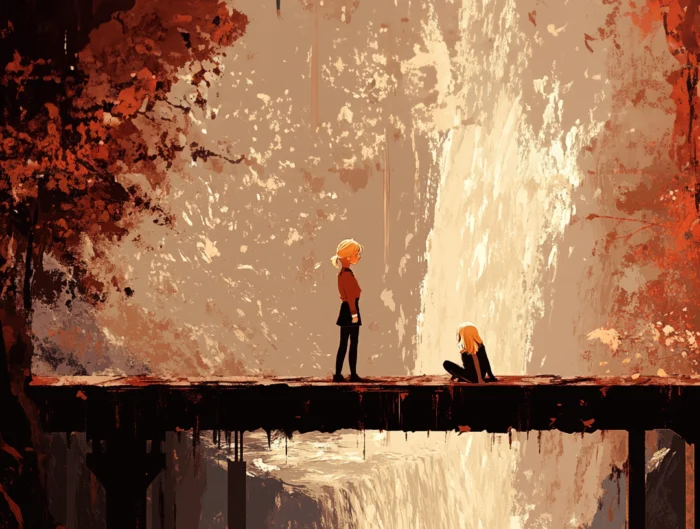This ice storm, the old woman tells me, will be the worst we’ve seen in decades, since I was probably a girl, that the governor has ordered everyone home, unless travel is an emergency. She tells me I should have stayed home, that she’s fine.
I don’t tell her that I told the night nurse not to come, that it was Valentine’s Day, and the nurse has a husband and teenaged sons. I don’t tell her that I told the nurse, the old woman is dying, and some things should be left to family. I don’t tell her that she has me younger than I really am, that while it has been a number of decades since we’ve seen this kind of punishing weather, that we had that one ice storm that canceled my seventh birthday party, then another one four years later, that canceled my eleventh, and then, that one five years after that, when a tree fell on the garage with my brother inside.
Instead, I tell her that cough doesn’t sound good. I make tea for both of us. I bless each with a shot of whiskey, the way she did for my coughs after I turned twelve.
She tells me how as a girl, she remembers the Ohio River freezing, that her uncle would walk across from Kentucky to see them. She tells me how her grandparents, before they left Brooklyn, would ice skate across the East River to Manhattan, and back again.
I don’t tell her that our family has been in Oregon since it became a state in 1859. I don’t tell her I remember these stories she’s telling me from our longtime family friend Hank Hodgekins. I don’t tell her this, because I like these stories too. I like to think of an uncle wanting to see us so much, he would walk from Kentucky.
She tells me she is dying, she tells me she’s seventy-seven, she tells me she’s one hundred and three, she tells me she is thirty-five, and her coming death is a tragedy, because she’s still raising two children, with a husband who can’t even make coffee.
I don’t tell her she’s ninety-six, that the men in our family die young and quick, while we women seem to drag on for decades, solid and strong, until we’re not. I don’t tell her she’s out lived my father by forty years, and my brother, by seventy-eight.
She coughs again, and the wind outside rattles the tree branches against the window. We settle in for the night, but then we don’t. We’re restless because of the storm, wondering if we’ll lose power. I make more tea, add more lemon and whiskey. I place candles, matches, and flashlights on her night table, her dresser, all throughout the house, just in case.
She tells me again I should have stayed home, that it would have been better, if her daughter had come.
I don’t tell her I am her daughter, or that she’s nicer when she thinks I am the neighbor from across the street.
Her daughter, she tells me, is also named Annie, a name she always found sweet, not that it rubbed off on her girl.
I don’t tell her, boy, have I been hearing that all my life.
She’s pretty, she tells me, but driven, which is why her daughter is too busy working to be bothered by her mother. But her son – her son! He was the sweet one, she says. Handmade cards for every holiday, even Arbor Day, the day for planting trees! Such a gifted artist. People don’t hear about Arbor Day anymore. I bet you don’t know when it is. Probably, it wasn’t taught in schools by the time you got there.
I don’t tell her it’s the last Friday in April, or that it varies by state, depending on specific planting seasons. I don’t tell her, because if I were her daughter, she would accuse me of giving her sass, but if the neighbor from across the street tells her, she would be impressed by the knowing of such a tidbit of information. I can’t stomach the discrepancy.
Oregon, she tells me, is a state of trees. You can’t live in Oregon, if you don’t love trees. And today is Oregon’s Birthday! Did you know?
I don’t tell her that every elementary school child in the state knows Valentine’s Day is Oregon’s birthday. It’s true the trees, the landscapes of waterfalls, coastlines and mountains are breathtaking. But it’s also true Oregon’s has its own complicated history as a Klan state, an accomplished excellence in racism. I don’t tell her, because she doesn’t like to hear it. It’s impolite to be critical, she thinks, and I know it’s pointless to tell a dying woman she’s wrong.
Wind blows outside, branches snap, and across the house, it sounds possible that a tree has fallen on the roof over the dining room.
Would you listen to that? And we do: we listen to the storm rage and the winds whistle like Gods from the Underworld.
Her formerly lake green eyes, now opaque with blindness, search the void at the end of her bed, as if she can see ghosts emerge from the icy gusts outside.
My son Stephen, she tells me, he died in an ice storm. A car accident, being driven home by the neighbor kid, Will Brewster, I think his name was. I think he had been drinking. I never did trust that kid. Never should have been out with the roads like that. Not at eighteen, why, boys that age are still learning to drive, I don’t care if the state has given them a license.
I don’t tell her anything. I just look at her. I really look at her: her strawberry blond hair now thin and sparse, how it reveals her scalp. Beneath her skin, once the color and smoothness of Pond’s Cold Cream, freshly whipped in the jar, is now yellowed and translucent as wax paper, I see blue veins webbed across bone, the workings of her life as it continues to labor on. In the prime of her life, she was a beautiful woman, with a brilliant mind for business. One minute, she could bestow her generosity like a blessing, and the next she could slice you open with a cruel comment. I had never known her to apologize to anyone for anything – she had a reason for everything. I wanted to peer inside her mind, to see what she really remembers, or what she’s distorted to make sense of for herself.
My son, she tells me, he was hit by a car, hit by a car that slid on a patch of black ice and couldn’t stop. That car slid right over Stephen. Stephen just wanted to run up to the corner for milk. She sips the last of her tea and holds her cup between her two hands in her lap.
Perhaps it’s cruel, but I do it anyway; I refill her tea cup with whiskey first.
My older brother died in an ice storm, too, I tell her. We had gone to bed, because we could hear the cracking of old tree trunks all around our house. Our parents said to let the storm do its damage and we would deal with it in the morning. My brother instead locked himself in the car with the engine running and the garage door shut. When I found him the next day, he was sprawled across the bench seat of the Chevrolet. He looked like he was sleeping.
She’s drank her whiskey, and it looks like she could finally close her eyes.
It’s true, she tells me, they look like they’re sleeping. Like sleeping sweet angels. Your poor mother. I bet she never got over it.
The winds swirl around us, as if they’re holding the house in the palm of their hand.
None of us do, I tell her. But now, she’s gone, with the gusts of wind and the ghosts outside.


